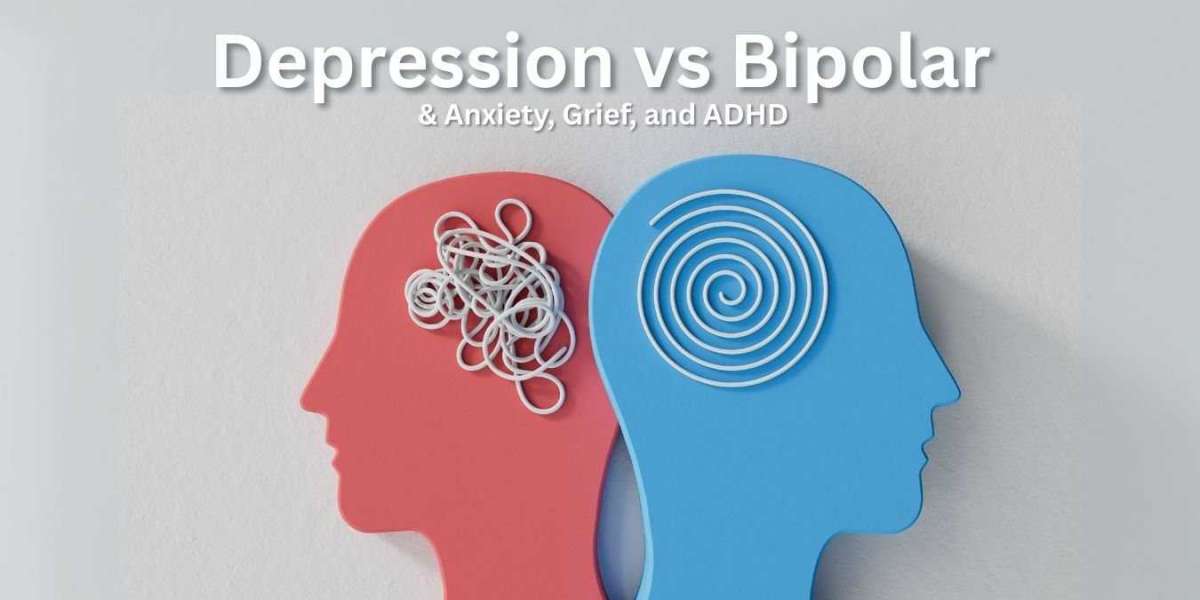Mental health is often misunderstood, especially when it comes to mood disorders. Two of the most common — and most confused — are depression and bipolar disorder. At a glance, they may seem similar. But in reality, Depression vs Bipolar Disorder is a story of two very different journeys. Understanding the difference is the first step toward healing, support, and better care.
At Evolve Psychiatry, we believe that awareness changes lives. Let's explore how these two conditions differ — and why knowing the difference matters.
Understanding Depression: A Persistent Low
Depression is more than just sadness. It’s a prolonged state of emotional numbness, fatigue, hopelessness, and disinterest in life. For someone living with depression, even getting out of bed can feel like climbing a mountain.
Common symptoms of depression:
Persistent sadness or low mood
Loss of interest in once-enjoyed activities
Fatigue or lack of energy
Trouble sleeping or sleeping too much
Feelings of guilt, worthlessness, or hopelessness
Difficulty concentrating
Physical aches with no clear cause
Thoughts of death or suicide
Depression doesn’t come and go quickly. It lingers — sometimes for weeks, months, or even years — and affects daily life, relationships, and productivity.
What Is Bipolar Disorder? The Ups and Downs
Now let’s shift gears. Bipolar disorder is a condition marked by mood swings that range from the lows of depression to the highs of mania or hypomania.
A person with bipolar disorder might experience:
Periods of intense depression (just like clinical depression)
Followed or preceded by manic episodes: elevated mood, increased energy, impulsive behavior, and risky decisions
There are different types of bipolar disorder:
Bipolar I Disorder: Characterized by full-blown manic episodes that last at least seven days or require hospitalization.
Bipolar II Disorder: Involves depressive episodes and hypomania (a milder form of mania).
Cyclothymic Disorder: Mood shifts that aren’t as extreme, but still disruptive.
These mood changes aren’t simply emotional fluctuations — they deeply impact thinking, behavior, and functioning.
Depression vs Bipolar Disorder: What’s the Real Difference?
At first glance, they may look similar — especially during the depressive phase of bipolar disorder. That’s where many people get confused.
But let’s break down the real distinctions between Depression vs Bipolar Disorder:
| Aspect | Depression | Bipolar Disorder |
|---|---|---|
| Mood pattern | Consistently low | Alternates between low (depression) and high (mania/hypomania) |
| Energy levels | Usually low | Fluctuates: low during depression, high during mania |
| Thought patterns | Negative, hopeless | Can be overly optimistic or irrational during mania |
| Sleep | Often too much or too little | May decrease dramatically during mania |
| Risk-taking behavior | Uncommon | Common during manic episodes |
Why does this matter? Because the treatment paths for these two conditions are different. Misdiagnosing bipolar disorder as depression alone can lead to ineffective — even harmful — treatment.
Real Lives, Real Impact
Imagine being treated for depression, only to have manic symptoms ignored or misdiagnosed. That’s the experience many people with bipolar disorder face. And the results can be life-altering.
On the other hand, someone with major depression may struggle for years before realizing it’s not just a “bad phase.”
Both journeys are real. Both deserve empathy, understanding, and proper care.
What Causes These Mood Disorders?
There’s no single cause, but a mix of factors can contribute:
Genetics: Family history plays a strong role, especially in bipolar disorder.
Brain chemistry: Imbalances in neurotransmitters like serotonin and dopamine can affect mood regulation.
Life events: Trauma, grief, and stress can trigger or worsen symptoms.
Medical conditions: Chronic illness or hormonal changes can also play a role.
At Evolve Psychiatry, we take a whole-person approach — not just looking at symptoms, but the full context of your mental health story.
How Are They Treated Differently?
For Depression:
Therapy (CBT, talk therapy)
Antidepressant medication
Lifestyle changes like regular sleep, exercise, and mindfulness
For Bipolar Disorder:
Mood stabilizers or antipsychotics are key to managing manic phases
Therapy helps recognize mood patterns and prevent relapses
Sleep and routine management are especially critical
Antidepressants alone can be risky for bipolar disorder — they may trigger manic episodes if not used with a mood stabilizer.
That’s why a clear diagnosis matters.
What Should You Do If You’re Not Sure?
If you or someone you care about is struggling with symptoms of either depression or bipolar disorder, take action today.
Talk to a mental health professional
Track your moods
Write down your symptoms
Seek help from clinics like Evolve Psychiatry, where you’ll be heard — not judged
Final Thoughts: Two Journeys, One Goal — Healing
The conversation about Depression vs Bipolar Disorder isn’t just about labels. It’s about lives, about stories that matter.
One journey may feel like a deep, endless tunnel. The other may feel like a rollercoaster. But both can be managed with the right diagnosis, care, and support.
At Evolve Psychiatry, we stand by you — wherever you are on your mental health path. Because understanding is powerful. And healing is always possible.











